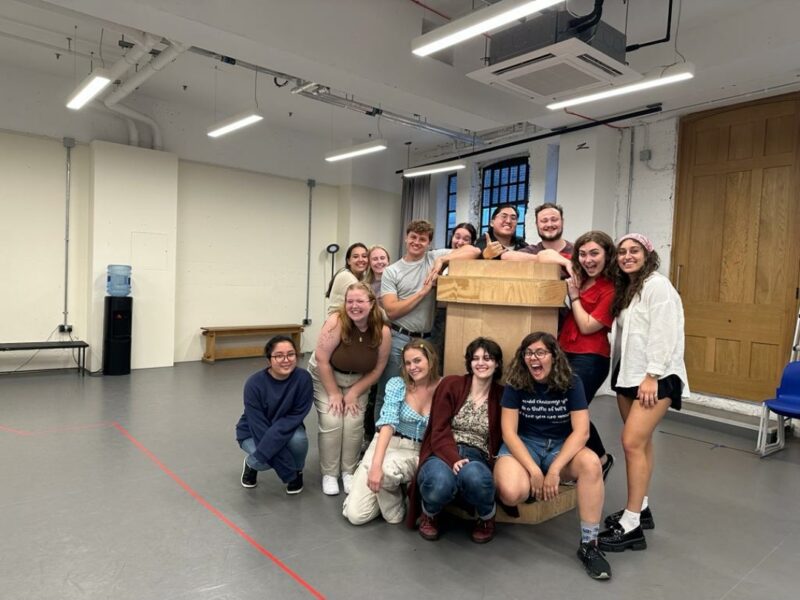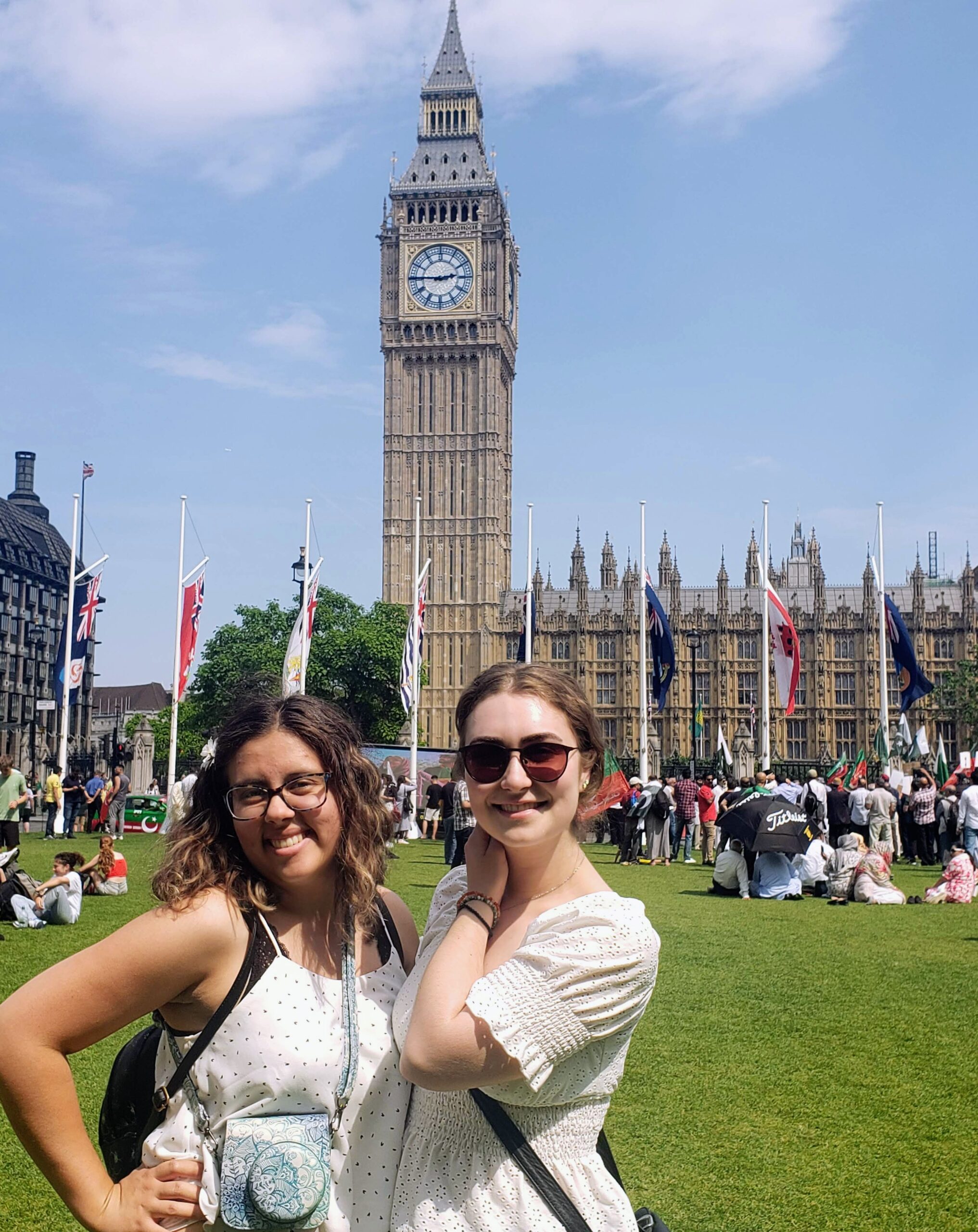61
Doing a study abroad program can be a life-changing experience. Just ask Sydni, a college student from Hofstra University and an AIFS Abroad Alumni Ambassador who spent a summer studying in London at the iconic Shakespeare’s Globe Theater.
Now that she’s officially part of our alumni community, Sydni can reflect on her study abroad experience at Shakespeare’s Globe Theater. Read on to hear all about it in our recent interview with her.
“My favorite highlights from the program was being given the opportunity to work with multiple creative professionals in the theatre industry in London and learning more about the city of London and history of Shakespeare.”
Sydni, AIFS Abroad in London, England alum at Shakespeare’s Globe
Q: Hi everyone! I’m here today with Sydni. Why don’t you introduce yourself?
A: Hi, my name is Sydni Rivero. I am a current Senior at Hofstra University and I took the AIFS Shakespeare Globe program [in] Summer 2023.
Q: That is awesome. Can I ask why you chose that program specifically?
A: Yeah, so when I was looking for studying abroad, I was very specific. Something that I always wanted to do was study abroad in London for theater. At my specific university, they have a really hard time with my major in studying abroad since there [are] a lot of classes that we have to take on campus in the spring, in the fall. So something that really worked out well was that this was summer program, so it didn’t have to interfere with the typical class work that I had to take every semester. I also had a couple friends who did it the year prior who had glowing responses about their experiences, so I knew it was a good fit for me.
Q: As you reflect on your time when you were abroad, were there any academic goals or personal goals you set for yourself? Did you achieve those goals or did you make any progress on them?
A: Yeah, for sure. One of my main things was just really exploring the city and getting a holistic learning experience of the history on my part of the end, and also just how theater is kind of done there. I feel really happy with my experience there. I actually visited the British Museum so I learned a lot about history through that, and it was really cool to see what they thought was important to put in their history museum. I was also walking past tour groups of elementary school middle school kids to see what growing up in London — what a student might be learning on a day-to-day basis at a field trip. So that was really cool.
I also got to see a ton of shows while I was there. Some highlights, I got to see Moulin Rouge, which is one of my favorites, and I got to see some performers that I’ve been following on Instagram and YouTube for a while who were in it. So that was really great experience. I also got to see Oklahoma which was a revival that transferred from Broadway to London, and I hadn’t been able to see it on Broadway. So, I was very excited to see this particular production — since it was so different from the original — in London. And also see kind of the reaction a London theater would have to an American production
Q: Is there something that you learned when you were on your program that you may not have if you didn’t study abroad?
A: So, my program was very specialized. I was doing Shakespeare stuff at The Globe — a lot of acting mainly was the focus. And we did some uh literature analysis, as well. But something that I wasn’t really aware of was the way that Shakespeare was intended to be performed, or at least the way they do it at The Globe. My school’s very big on Shakespeare — I’ve seen a lot of Shakespeare, done a lot of study here. Over there in The Globe, they do it a very different way. It’s in a very unique space, where you are performing to people in front of you, above you, and on the sides of you. So learning about keeping almost a 360º perspective of the audiences in your mind while you’re performing and keeping your whole body alive was something new. And the connection that every actor made with the audience member, it was so collaborative — audience member and actors with the storytelling. Seeing that live was so thrilling, because the audience was in the story almost. The actors would be talking to each other and then they’d look at the audience member and be talking to the audience member about the struggles that they’re having with the actor that’s on stage. And the monologues and soliloquies would also be [spoken as] a heart-to-heart with a friend in the audience. So that kind of connection is not something I’ve ever seen in Shakespeare before. It made it a lot more digestible, since it is a difficult language, and made a lot more sense from a modern perspective — to kind of have this fostering relationship with the each actor and their story that they’re telling.
Q: You might like some talents and strengths that become better when you’re abroad that you may not have thought would have become better than they were in the United States. Did you really witness this happening at all? If any of your talents suddenly shown while you were abroad?
A: Specifically with my performance, at my school we have a speech class, a movement class, and an acting class. Speech and movement are taught by the same professors for all four years while I’m here, so you know their curriculum and you kind of work with them throughout four years, and that’s nice. You get to build that relationship with that professor and really know what they are looking for and learn their style of performing in those aspects. But working with different people in those same subjects I found really enlightening. Sometimes I don’t always see I eye-to-eye with my movement professor [here in the United States], but the movement Professor overseas presented the material in a much different way that I’d never really thought about it. So I got a little bit more out of my head and was able to explore my physicality in a way that was a lot more relaxed and calm environment. It really allowed me to explore and have fun with it and I feel some kind of freedom that I’ve never really felt with physicality before. So that was really nice. I also have kind of struggled with performing Shakespeare because it is a difficult talent and I’ve worked on it here at Hofstra many times— because, like I said, Hofstra is a big Shakespeare school — but I never felt like it really clicked. Being abroad — the way the course was set up is you work with a ton of different people at The Globe. Hearing all their perspectives and kind of helping you see a lot of different ways to take Shakespeare and perform it and make it a lot more relatable and closer to home for you, that all really clicked. By the final performance that we did through the classes, I really felt like I understood how to perform Shakespeare. That was a really good experience.

Q: London is such such a big city and there’s so much history and culture, and there’s a lot of different backgrounds in the city, too. Was there a time the differences in backgrounds impacted your interactions with others?
A: I found a lot of people in London to be extremely welcoming and very excited to interact with Americans. I once was getting lunch at a place for fish and chips and right off the bat they know you’re American because you’re speaking in an American accent. So they were very excited and, because it was a local place where we were saying in Tufnell Park, which was not like in the heart of the city. So they were like, “Oh, where are you from? Why are you here?” — that kind of thing, and very excited.
Talking about different backgrounds, too — something that I didn’t even think about before I went was being in program with other American students but [from] different universities. I had never really talked to anyone else from a different theater program before. I have friends that go to different universities but they’re studying a bunch of different topics and there is kind of a niche with pursuing theater as your your college career and following career. So hearing that unique experience at different universities and what those students were kind of going through, what kind of classes they were learning, and kind of how their training has been different from mine was really enlightening and really cool.

Q: Being abroad, out of the United States, was there any time where you were kind of being more sustainable or being more green in your lifestyle? Do you think if you did, would you bring any of that back to the United States with you now?
A: I think part of this was also living in a such public transit city. It was so easy to get around. I was using the Tube all the time. I was walking places, using the bus system. There was never even a thought in my mind that I would even need a car to get anywhere. So just the real ease of getting around from place to place was really nice, and that’s something that I kind of want to keep in mind — living closer to public transit and being able to use those facilities as much as possible to limit emissions from cars and whatnot. I think that is really helpful. I also really loved walking to like farmer markets — there are lot of farmer markets in London. So it was really nice to go and get fresh produce every single day. I often got apples they had very cheap apples, so I would get those for breakfast before I’d go to class or whatnot. I got other fruits and vegetables as well. Some stuff I’d cook back at my place. So I think really utilizing like the ability of eating from the source from a farmer market was really nice, as well.
Q: Is there any advice that you would give people who are planning to study abroad or thinking about it?
A: I think mainly it’s you know take that final step. Don’t be afraid of the unknown and be more excited about what you might gain from the experience. It’s so hard to put in perspective what you’ll learn from a global transition like this, but you’ll have a lot more perspective no matter where you go — on how people act in different arenas and culture; how people you know walk around day-to-day; what they think is funny versus what they think is serious; when people eat certain times of the day. All of that I think is just such an empowering experience. You can learn a lot from other cultures and bring that back home to improve yourself as a person.
Source link
All Materials on this website/blog are only for Learning & Educational purposes. It is strictly recommended to buy the products from the original owner/publisher of these products. Our intention is not to infringe any copyright policy. If you are the copyright holder of any of the content uploaded on this site and don’t want it to be here. Instead of taking any other action, please contact us. Your complaint would be honored, and the highlighted content will be removed instantly.

